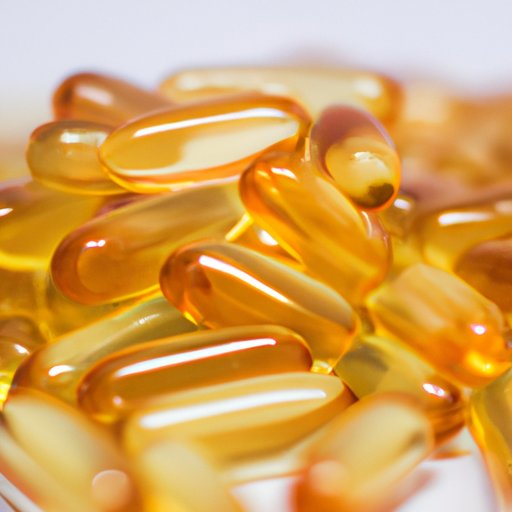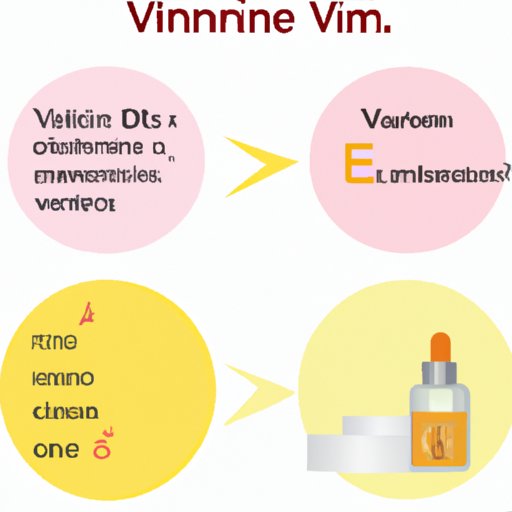
I. Introduction
Vitamin E is a crucial micronutrient that plays an essential role in human health. This fat-soluble antioxidant is an excellent source of protection for our cells and organs from the damaging effects of free radicals. In this article, we will explore where vitamin E comes from, its natural sources, health benefits, and the role it plays in skincare.
II. Unearthing the Origins of Vitamin E: A Historical Account
Vitamin E was first discovered by researchers in 1922 when they found that it was necessary for successful and healthy fetal development. Since then, the benefits of this micronutrient have continued to unfold, leading to the creation of an entirely new branch of nutritional science. It is still debated today whether vitamin E should be classified as a vitamin or a hormone, which showcases just how important this fascinating and mysterious nutrient truly is. In 1925, the name “vitamin E” was coined by a researcher named Herbert McLean Evans to describe the fat-soluble nutrient that he had discovered earlier.
III. From Wheat Germ to Sunflower Seeds: Following the Trail of Vitamin E
Natural sources of vitamin E are plenty and varied, and they include wheat germ, sunflower seeds, almonds, hazelnuts, avocado, broccoli, spinach, and more. Vitamin E can be found in healthy cooking oils like olive, safflower, and canola oil. Getting sufficient vitamin E from natural sources is essential since synthetic supplements have been found to be less effective in contributing to this nutrient’s overall health benefits.
IV. Delving into the Science of Vitamin E: Its Natural Sources and Health Benefits
Vitamin E is composed of two sub-groups, tocopherols and tocotrienols. Of the tocopherols, alpha-tocopherol is the most abundant form found in our bodies and is considered the most important contributor to our overall health. Vitamin E is an active antioxidant, counteracting the effects of oxidative stress that can destabilize and damage our cells and organs. Over time, this damage can lead to the development of chronic illnesses like heart disease, arthritis, and cancer. Some of the specific health benefits of vitamin E include its ability to boost immune health, prevent cellular damage, support eye health, and reduce inflammation levels.
V. Organic vs. Synthetic Vitamin E: Which is Better for Your Body?
There is a significant difference between organic and synthetic vitamin E. Most nutritional supplements are made using synthetic vitamin E, which is less effective in our bodies than natural sources like wheat germ oil or sunflower seeds. These natural sources of vitamin E are more expensive, but the benefits of organic vitamin E are considered to have far greater protection against oxidative stress and cellular damage than synthetic sources. For those who wish to take a supplement, it is recommended that only organic, natural sources of vitamin E be considered.
VI. Vitamin E Rich Foods: A Comprehensive Guide for a Healthy Diet
Some of the most notable vitamin E-rich foods include sunflower seeds, almonds, avocado, hazelnuts, mango, sweet potato, pumpkin, and pine nuts. A diet that is rich in vitamin E is not only beneficial for overall health, but it can also slow down the aging process, boost cognitive abilities, and prevent the onset of chronic illnesses.

VII. The Role of Vitamin E in Skincare: How This Antioxidant Benefits Your Skin
Thanks to the high antioxidant levels, vitamin E is a popular ingredient in many skincare products. Not only does it reduce inflammation levels and slow down cellular damage, but it can also lighten scars and hyperpigmentation, improve skin texture and appearance, and delay the signs of aging.
VIII. Going Beyond Supplements: Exploring Alternative Sources of Vitamin E
There are other, less likely sources of vitamin E that have been found to be incredibly rich in antioxidants. These alternative sources include argan oil, which is known for its healing properties, and Moringa leaves, which are an incredible source of vital micronutrients, vitamins, and antioxidants.
IX. Conclusion
In conclusion, vitamin E is a crucial nutrient that plays a vital role in maintaining good health and provides outstanding protection against abnormal cellular growth, chronic illnesses, and aging. Incorporating whole foods that are rich in vitamin E is key to living a healthy and vibrant life. And for those who want to add it directly to their skincare, vitamin E may improve skin appearance while protecting skin from the harmful effects of free radicals in the environment.




